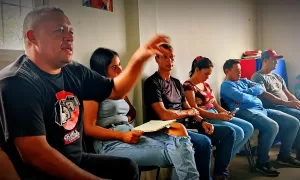Countercurrents Collective
Argentina’s leftist president-elect Alberto Fernandez said Tuesday that he would renounce the remaining $11 billion tranche of the country’s International Monetary Fund (IMF) loan as soon as he takes office next month.
Outgoing center-right President Mauricio Macri agreed a massive $57 billion loan package last year, but the austerity measures he imposed failed to right the economy.
“What I want is to stop asking (for money), and that they let me pay,” said Fernandez, who takes office on December 10 after ousting Macri in last month’s elections.
“I have an enormous problem. And I’m going to ask for $11 billion more?” the incoming president said in an interview Argentina’s Radio Con Vos.
Fernandez said he will “try to revive the economy in order to pay and solve the debt problem sensibly.”
The return to power of protectionist Peronists has raised fears of yet another debt default, and eroded the peso’s value.
The poverty rate has risen to more than 35 percent; inflation for the year to September was at almost 38 percent, while the peso has depreciated 70 percent since January 2018.
The president-elect has insisted his government would not default but rather seek to renegotiate the terms of the IMF loan, and sought to reassure voters in last month’s election that their bank deposits would be safe under his administration.
“It’s like a guy who drinks a lot and is a little drunk. The solution is not to continue drinking. The solution is to stop drinking,” he told the radio.
Debt soared by about 100 billion under Macri and now exceeds 90 percent of GDP. At the time of his election in 2017, it was 38 percent of GDP.
“I try to be a serious person. A person who tells you ‘I’m going to do such and such a thing,’ and you know he’s going to do it.
“I don’t want to sign agreements that I’m not going to fulfill. Those agreements were already signed by Macri. He signed one, two, three and fulfilled none,” said Fernandez.
The IMF suspended the release of a $5.4 billion disbursement in September following the government’s failure to meet inflation targets.
“We want them not to lend us more money, but to let us develop. Let’s discuss the time I need to develop, but don’t give me more money.”
Debt soared by about $100 bln under Macri and now exceeds 90 percent of GDP. At the time of his election in 2015, it was 38 percent of GDP.
There was no immediate response from the IMF.
In recent days, the IMF named a new head of mission in Argentina, to replace the outgoing Roberto Cardarelli.
The Italian official’s replacement in Buenos Aires is Venezuelan Luis Cubeddu. The 53-year-old has experience of Argentina, having worked in the country between 2002 and 2004.
According to reports, Cubeddu has come across Fernández before, when the president-elect served as cabinet chief for then-president Néstor Kirchner.
The Frente de Todos leader said in the interview that his goal is “to revive the economy in order to pay and solve the debt problem sensibly.”
“If you have a problem, because you are in debt, do you think the solution is to continue borrowing?” he added.
Argentina’s economy has spent the last 20 months in recession. According to IMF estimates, economic activity will decline by 3.1 percent this year.
Debt under the Mauricio Macri administration has grown by around US$100 billion and now exceeds 90 percent of gross domestic product, according to international organizations. When President Macri took office in 2015, debt stood at 38 percent of GDP.
Last week, Fernández told IMF Managing Director Kristalina Georgieva that he would seek a “sustainable” solution to both Argentina’s debt with the multilateral lender and private bondholders.
Bloomberg reported Tuesday that the president-elect’s team would seek to hold simultaneous negotiations with both parties in a bid to find a better solution.
Argentina has around US$28 billion in debt held by private investors and international organizations that will mature in 2020, Treasury Minister Hernán Lacunza said this week.
While Fernández has, for the most part, shied away from giving details about his future Cabinet officials, he did confirm Tuesday that Marco Lavagna would head the INDEC national statistics bureau.
Speaking to local news channels, the Frente de Todos leader said it was “expected” that Lavagna – the son of ex-presidential candidate and former economy minister Roberto Lavagna – would take up the position.
INDEC was a source of controversy under the previous government led by Fernaández’s vice-president-elect, Cristina Fernaández de Kichner, after it became subject to political pressures that put in doubt the credibility of official data.




